-
by Julia Roe
- Updated
- 257 Comments
Top 5 Probiotics for Your Digestive and Immune Health
Signs You Might Need a Probiotic:
Diarrhea or Constipation Negative Mood Indigestion Bloating Cramps Mental Fog
Easily Tired Weak Muscles Frequently Sick Weight Fluctuations
Key Considerations for Selecting a Probiotic Supplement:
- Colony Forming Units (CFU): CFU refers to the number of viable bacterial cells per serving. While higher CFU counts generally indicate greater potential for successful colonization, optimal dosages vary depending on specific health goals.
- Strain Variety: Probiotic supplements often contain multiple bacterial strains, each with unique properties. Diversity in strains may enhance their overall effectiveness in addressing various health concerns.
- Clinically Supported Strains: Selecting strains with robust scientific backing demonstrating their efficacy for specific health benefits is crucial.
- Prebiotic Inclusion: Prebiotics, non-digestible fibers that serve as food for beneficial gut bacteria, can be included in probiotic supplements to support bacterial growth and colonization.
- Manufacturing Standards: Choosing a reputable manufacturer that adheres to Current Good Manufacturing Practices (cGMP) issued by the Food and Drug Administration (FDA) ensures quality and safety.
What to avoid in a probiotic:
Low CFU Low Strain Variety Bottles that let light in Not made in America Not lab tested
Overall Score:
BlueBiotics: Ultimate Care offers a high-CFU, multi-strain probiotic formula with prebiotics and an enteric coating. While user testimonials suggest potential benefits, more rigorous scientific studies are needed to definitively confirm the product’s efficacy for specific health concerns. The inclusion of third-party verification by medical professionals and cGMP manufacturing adds credibility to the product’s quality and safety claims. Consumers should consult with their healthcare professional before starting any new supplement, including probiotics.
Key Features:
- High CFU Count: 61 billion CFU per capsule, exceeding the minimum recommended dosage for many health concerns.
- Diverse Strain Profile: Includes 11 distinct bacterial strains, potentially offering broader health benefits compared to single-strain formulas.
- Prebiotic Inclusion: Formulated with prebiotics to support the growth and colonization of beneficial gut bacteria.
- Capsule Quality: Ensures optimal delivery of viable bacteria to the intestines by protecting them from stomach acid.
- Clean Label Formula: Free of preservatives, additives, and common allergens like gluten.
Third-Party Verification: Claimed to be verified by medical professionals (MD, PhD, RDN) and manufactured in a cGMP facility, ensuring quality and safety. - Dosage: One capsule per day for convenient daily supplementation.
Potential Benefits:
- High CFU count and diverse strain profile suggest potential for addressing various digestive issues like bloating and irregular bowel movements.
- User testimonials highlight improvements in digestion, regularity, and even mood and mental clarity.
Pros and Cons:
- Manufactured in a cGMP facility
- Confirmed made in the USA
- Zero preservatives or additives
- Single daily capsule dose, easy swallow
- Exceptional return policy
- Only sold direct from manufacturer
Ultimate Flora by Renew Life
Overall Score:
Ultimate Flora utilizes a diverse blend of researched probiotic strains. However, the discrepancy between advertised and actual CFU count raises concerns about product efficacy. Additional studies are necessary to definitively assess the long-term viability and colonization potential of the included strains.
Key Observations:
- Strain Composition: Ultimate Flora contains well-documented probiotic strains, potentially offering various health benefits.
- Strain Viability: While the product boasts a high CFU count, independent analysis revealed a lower number of viable bacterial colonies, suggesting potential issues with product stability or storage.
- Colonization Potential: Studies indicate that some strains within the formula were successful in establishing colonies within the digestive tracts of participants. However, further research is needed to determine the long-term persistence of these colonies.
Despite the hefty CFU advertised by Ultimate Flora, a large portion of the probiotic colonies were no longer alive upon analysis. This resulted in the effective CFU being much lower than what was claimed by the product. Consumers should consider independent reviews and lab analyses when evaluating probiotic supplements.
Pros and Cons:
- 30 Billion CFU in every capsule
- 10 Diverse Strains
- Vegan & Gluten Free
- One capsule per day
- Refrigeration recommended
- No prebiotic element
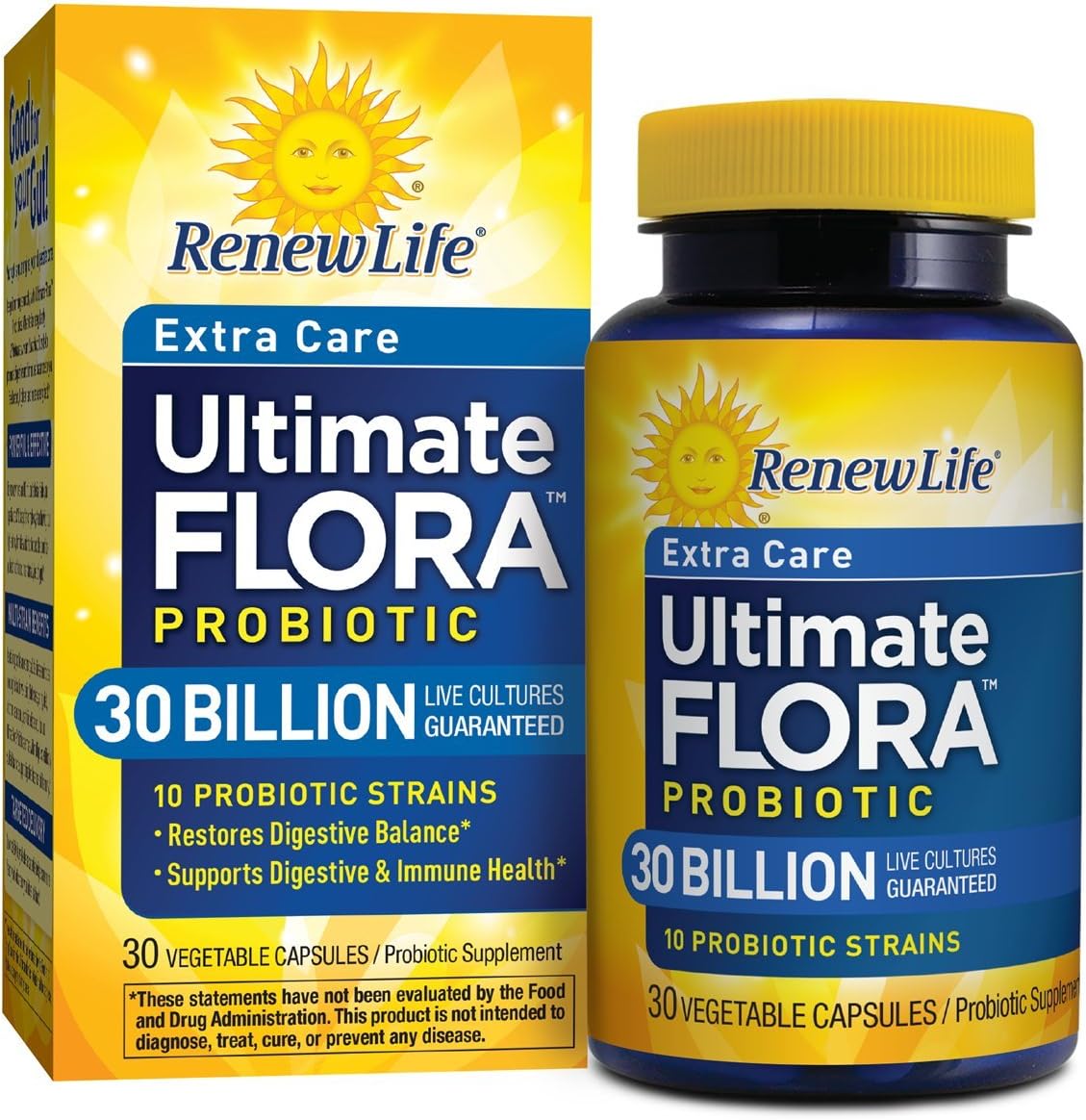
Note: Not an affiliate link! CHR does not benefit and provides links to Amazon as a courtesy to our readers.
Raw Probiotics by Garden of Life
Overall Score:
Garden of Life Dr. Formulated Ultimate Care Probiotic offers a high-CFU, multi-strain probiotic formula free from preservatives and additives. The diverse strain profile suggests potential for broad health benefits. However, the lack of enteric coating could limit the efficacy of some strains. Consumers seeking a high-CFU, raw, and diverse probiotic formula may find this product appealing, but the potential impact of stomach acid on certain strains should be considered.
Key Features:
- High CFU Count: 100 billion CFU per serving, exceeding the minimum recommended dosage for many health concerns [1]. However, the optimal dosage can vary depending on individual needs and specific health goals.
- Diverse Strain Profile: Contains 34 distinct bacterial strains, potentially offering a wider range of health benefits compared to single-strain formulas.
- Raw and Preservative-Free Formula: While this may shorten the shelf life of the probiotic strains, some consumers prioritize the absence of additives.
Potential Limitations:
- Lack of Enteric Coating: The product is not enteric-coated, potentially reducing the viability of some of the included strains as they pass through the stomach acid. Strains like Streptococcus thermophilus may be particularly susceptible.
Pros and Cons:
- 100 Billion CFU per serving
- 34 Diverse Strains
- Zero preservatives or additives
- Vegan & gluten-free
- Not enteric coated
- High number of dead cells
- Contains less-studied strains
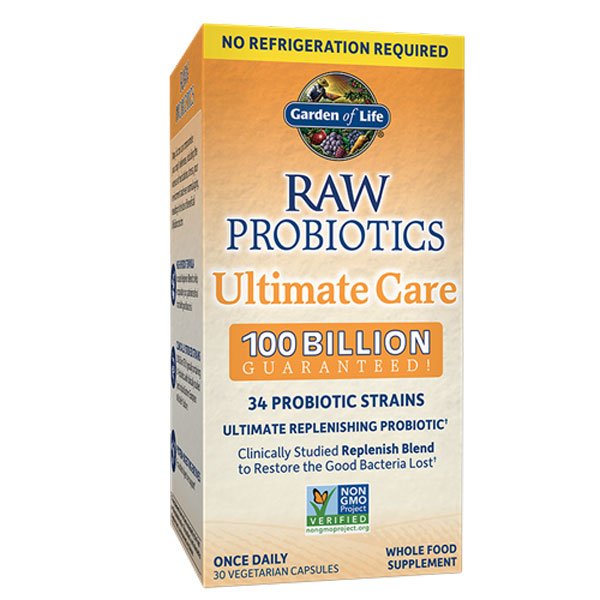
Note: Not an affiliate link! CHR does not benefit and provides links to Amazon as a courtesy to our readers.
Trust Your Gut by Ora
Overall Score:
Trust Your Gut Probiotics by Ora utilizes a blend of common probiotic strains with a focus on a clean label formulation. The inclusion of a prebiotic fiber adds another layer of potential benefit. However, the lack of enteric coating could limit the efficacy of some strains. Consumers seeking a clean-label, prebiotic-containing probiotic formula may find this product appealing, but the potential impact of stomach acid on certain strains is a notable drawback to consider, especially considering the price point.
Key Features:
- Strain Composition: Contains 11 bacterial strains, including various Lactobacillus and Bifidobacterium species commonly associated with digestive and immune health benefits.
- Clean Label Formula: Free from common allergens (dairy, soy, tree nuts), sweeteners, and GMO ingredients, catering to consumers with dietary restrictions.
- Prebiotic Inclusion: Inulin, a prebiotic fiber, is included to potentially support the growth and activity of beneficial gut bacteria.
Potential Limitations:
- Lack of Enteric Coating: The absence of an enteric coating raises concerns about the viability of some bacterial strains as they pass through the stomach acid. While some strains may exhibit inherent stomach acid resistance, enteric coating offers a more reliable method for maximizing strain delivery to the intestines.
- Cost: Compared to other probiotic supplements, Trust Your Gut by Ora falls on the pricier end.
Pros and Cons:
- 52 Billion CFU in every capsule
- 11 Diverse Strains
- Vegan & gluten-free
- Not enteric coated
- Contains fillers
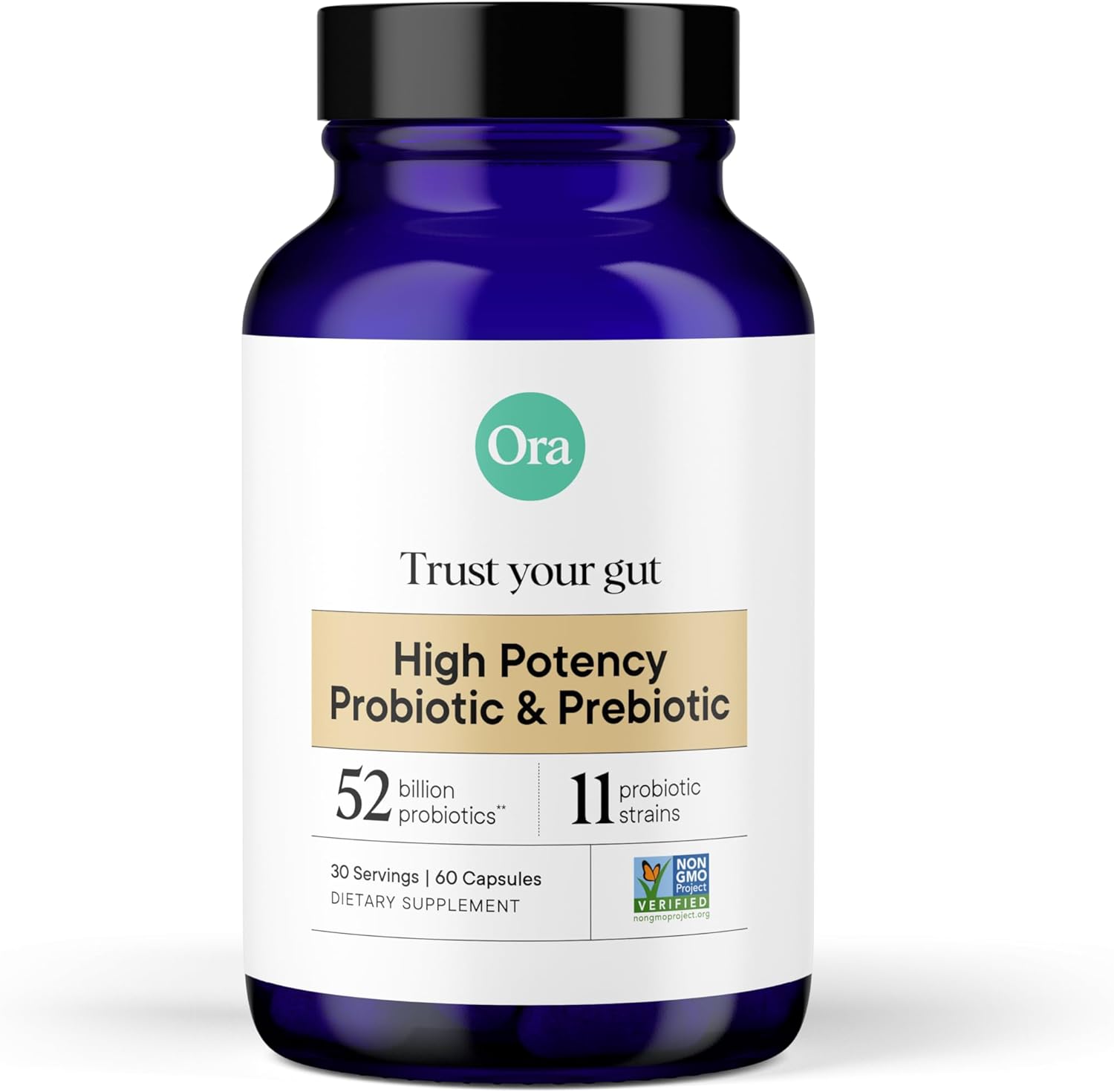
Note: Not an affiliate link! CHR does not benefit and provides links to Amazon as a courtesy to our readers.
Multi-Strain Probiotic by Innovix Labs
Overall Score:
InnovixLabs Probiotic offers a comprehensive blend of probiotic strains with enteric coating for improved delivery. This combination suggests potential for addressing a broad spectrum of gut health concerns. However, the presence of certain additives may be a consideration for consumers seeking a simpler ingredient list.
Key Features:
- Comprehensive Strain Profile: Contains 31 bacterial strains, including complete Lactobacillus and Bifidobacterium complexes as well as Streptococcus thermophilus variants. This diverse blend has the potential to offer a wide range of health benefits.
- Enteric-Coated Capsules: The enteric coating protects the probiotic strains from degradation by stomach acid, ensuring optimal delivery to the intestines for potential colonization.
Potential Limitations:
- Use of Additives: The product contains microcrystalline cellulose, hydroxypropyl methylcellulose, and silicon dioxide as additives. While generally recognized as safe (GRAS) by the FDA, some consumers may prefer a more minimalist formulation.
Pros and Cons:
- 50 Billion CFU in every serving
- 31 Diverse Strains
- Enteric coated
- High number of synthetic ingredients
- Low or Very Low CFU per strain
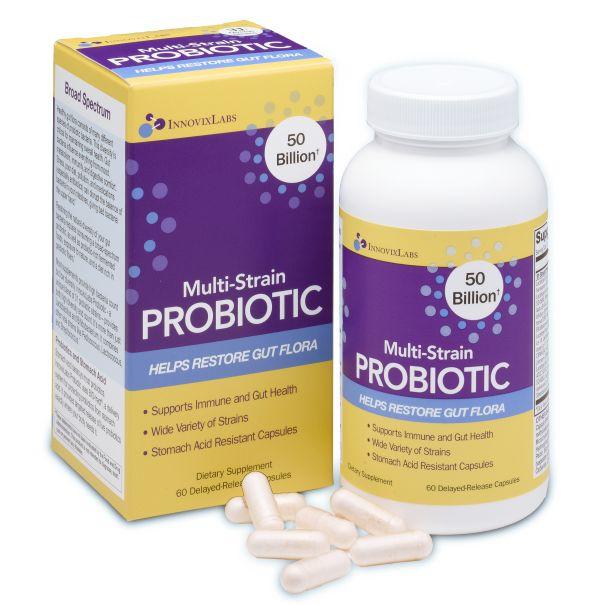
Note: Not an affiliate link! CHR does not benefit and provides links to Amazon as a courtesy to our readers.
Research behind the fastest rising gut health supplement in the world.
The human gut microbiome is a complex ecosystem comprised of trillions of bacteria, both beneficial bacteria and potentially harmful bacteria. These bacteria play a crucial role in digestion, nutrient absorption, and immune function. Disruptions in the gut microbiome, known as dysbiosis, have been linked to various health concerns, including digestive issues, inflammatory bowel disease, and other health conditions.
Probiotic supplements, containing live bacteria intended to restore balance in the gut microbiome, have emerged as a popular strategy for promoting gut health. However, with a growing market saturated with diverse options, navigating the landscape of probiotic supplements can be challenging. This guide aims to equip consumers with the scientific knowledge necessary to make informed decisions concerning probiotic supplementation.
Fermented Foods and Yogurts Versus Supplements
Probiotics in supplement form often provide a higher and more consistent dose of beneficial bacteria compared to fermented foods, ensuring more reliable gut health benefits. Additionally, probiotic supplements are also put into capsules designed to survive stomach acid, delivering more live bacteria to the intestines where they are most effective.
Top Probiotic Strains:
- Bifidobacterium breve improves brain function, enhances immunity, and helps digest gluten*.
- Bifidobacterium lactis promotes wound healing and enhances immunity*.
- Lactobacillus acidophilus found to improve gut health and combats harmful bacteria*.
- Lacticaseibacillus rhamnosus improves immune function and mood*.
- Ligilactobacillus salivarius supports oral health and enhances immunity*.
- Saccharomyces boulardii found to help reduce bowel issues from antibiotics and H. pylori*.
Sources
- Heidarzadeh-Rad N, Zarghami M, Mohammadinejad P, et al. Effect of prebiotics, probiotics, synbiotics on depression: results from a meta-analysis. BMC Psychiatry. 2020;20(1):324. doi:10.1186/s12888-020-02790-
0. - Wang H, Lee IS, Braun C, Enck P. Effects of probiotics on central nervous system functions in animals and humans: a systematic review. J Neurogastroenterol Motil. 2016;22(4):589-605. doi:10.5056/jnm16018.
- Cho YA, Kim J. Effect of Probiotics on Blood Lipid Concentrations: A Meta-Analysis of Randomized Controlled Trials. Medicine (Baltimore). 2015;94(43). doi:10.1097/MD.
0000000000001714. - Hao Q, Dong BR, Wu T. Probiotics for preventing acute upper respiratory tract infections. Cochrane Database Syst Rev. 2015;(2).doi:10.1002/14651858.CD006895.
pub3. - Sun J, Buys N. Effects of probiotics on type II diabetes mellitus: a meta-analysis. J Transl Med. 2016;14(1):219. doi:10.1186/s12967-016-0966-1.
- Zhou, C., Jung, C.-G., & Michikawa, M. (2022). Probiotic Bifidobacterium breve MCC1274 mitigates Alzheimer’s disease-related pathologies in wild-type mice. Nutrients, 14(12), 2543. https://doi.org/10.3390/nu14122543
- Tian, P., & Chen, W. (2023). Bifidobacterium breve CCFM1025 improves sleep quality via regulating the activity of the HPA axis: A randomized clinical trial. Nutrients, 15(21), 4700. https://doi.org/10.3390/nu15214700
- Xiao, J., Katsumata, N., Bernier, F., Ohno, K., Yamauchi, Y., Odamaki, T., Yoshikawa, K., & Ito, K. (2020). Probiotic Bifidobacterium breve in improving cognitive functions of older adults with suspected mild cognitive impairment: A randomized, double-blind, placebo-controlled trial. Journal of Alzheimer’s Disease, 77(1), 139-147. https://doi.org/10.3233/JAD-200488
- Vradelis, S., Giatagana, E., Zafeiropoulou, K., Sotiropoulou, P., & Mouzas, I. (2022). The probiotic strains Bifidobacterium lactis, Lactobacillus acidophilus, Lactiplantibacillus plantarum, and Saccharomyces boulardii regulate wound healing and chemokine responses in human intestinal subepithelial myofibroblasts. Pharmaceuticals, 15(10), 1293. https://doi.org/10.3390/ph15101293
- Chiang, B. L., Sheih, Y. H., Wang, L. H., & Liao, C. K. (2000). Enhancing immunity by dietary consumption of a probiotic lactic acid bacterium (Bifidobacterium lactis HN019): Optimization and definition of cellular immune responses. European Journal of Clinical Nutrition, 54(11), 849–855. https://doi.org/10.1038/sj.ejcn.1601093
- BMC Gastroenterology. (2024). Lactobacillus acidophilus CRL 1014 improved “gut health” in the SHIME® reactor. Retrieved from https://bmcgastroenterol.biomedcentral.com
- Frontiers in Immunology. (2022). Lactobacillus spp. for Gastrointestinal Health: Current and Future Perspectives. Retrieved from https://www.frontiersin.org/articles/10.3389/fimmu.2022.840245/full
- Liu, Y., Jiang, J., Ed-Dra, A., Li, X., Peng, X., Xia, L., et al. (2022). Lacticaseibacillus rhamnosus P118 alleviates intestinal inflammation and promotes microbiota-mediated protection against Salmonella fatal infections. Frontiers in Immunology. Retrieved from https://www.frontiersin.org/articles/10.3389/fimmu.2022.973224/full
- Choi, B. S-Y., Brunelle, L., Pilon, G., Cautela, B. G., Tompkins, T. A., Drapeau, V., Marette, A., & Tremblay, A. (2022). Lacticaseibacillus rhamnosus HA-114 improves eating behaviors and mood-related factors in adults with overweight during weight loss: a randomized controlled trial. Nutritional Neuroscience. https://doi.org/10.1080/1028415X.2022.2081288
- Ai, L. (2024). Understanding Ligilactobacillus salivarius from Probiotic Properties to Omics Technology: A Review. Foods, 13(6), 895. https://doi.org/10.3390/foods13060895
- Yan, S., Yu, L., Tian, F., Zhao, J., Chen, W., Chen, H., & Zhai, Q. (2023). Ligilactobacillus salivarius CCFM 1266 modulates gut microbiota and GPR109a-mediated immune suppression to attenuate immune checkpoint blockade-induced colitis. Food & Function, 14, 10549-10563. https://doi.org/10.1039/D3FO03867J
- BMC Gastroenterology. (2024). Effectiveness of Saccharomyces Boulardii CNCM I-745 probiotic in acute inflammatory viral diarrhoea in adults: results from a single-centre randomized trial. Retrieved from https://bmcgastroenterol.biomedcentral.com
- Frontiers in Microbiology. (2023). Saccharomyces boulardii Allows Partial Patients to Avoid Reusing Bismuth Quadruple for Helicobacter pylori Rescue Therapy: A Single-Center Randomized Controlled Study. Retrieved from https://www.frontiersin.org/articles/10.3389/fmicb.2023.973224/full
*these sources are cited and referenced for informative purposes only and not affiliated with CHR.


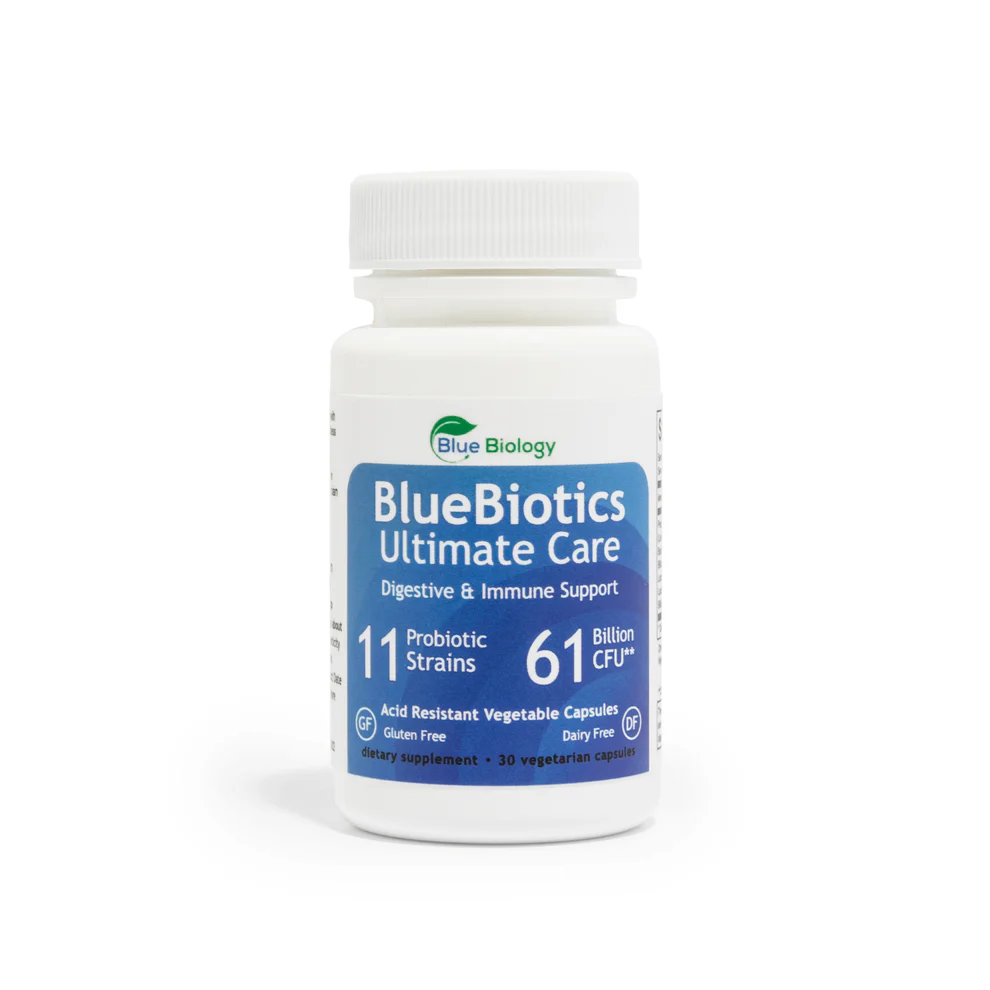

257 Responses
Julia, I saw this article and decided to try the Blue Biotics for my IBS symptoms. I’m 62 still working, and the bathroom issue could really prove trying. I’m happy to report this product has helped tremendously! I now have both my daughter’s taking it also.
Great to hear Jeannie.
I’m mainly interested in cutting down weight.we eat very healthy at home 80% fruits and veggies and I’d like to add a probiotic to get rid of extra fat. Which of these is best for that? Thank you! We are healthy & have no medical issues.
Hi Megan, I would try out our top pick but each of these probiotics has their merits.
Do u have a recommendation for a probiotic for someone who is high oxalates and histamine? Thank you, I am not sure what probiotics to avoid and neither are my doctors. They only know what medications to prescribe. Thank you so much for your help. Your reviews are great.
Hi Janet, I would try one of the products listed here and reevaluate from there.
Julia. Is it necessary to take an acid reducer such as Zantac, when taking probiotics for maintenance?
No, there’s no indication that’s necessary – just choose a probiotic has enteric coating and you should be good to go.
Zantac changes your microbiome and reduces the gut flora due to changes in pH. So by taking the Zantac, you *could* be making matters worse. Taking a reputable probiotic *might* help you overcome the GI issues you’re having which is leading you to take the Zantac or similar medication.
More here: https://www.ncbi.nlm.nih.gov/pmc/articles/PMC4254461/
How important is refrigeration? I notice at Whole Foods, all the probiotics are refrigerated, but if I’m ordering online, who knows how long it’s been sitting in a warehouse. Thanks.
It depends on the particular product, but refrigeration can extend the life of the cultures. Choosing a brand that freeze-dries their product helps.
You have stated that probiotics have a definite shelf life. How long, for example, is the shelf life for BluBiotics Ultimate Care? Is it worth the price of purchasing a three-month supply if the product doesn’t last, even if stored precisely as recommended by the manufacturer?
The last we checked, each of these products has a shelf life of a year, but regardless of the brand, it’s always good to refrigerate probiotics because it will extend the life of the living microorganisms.